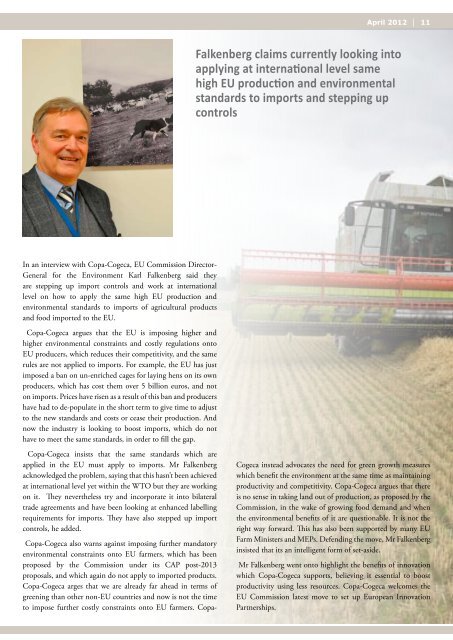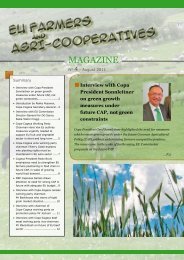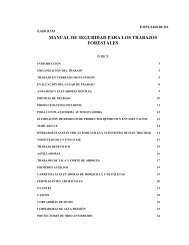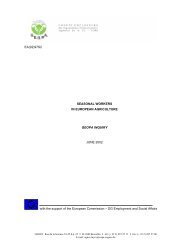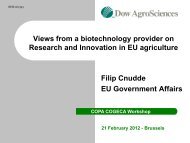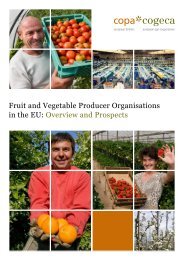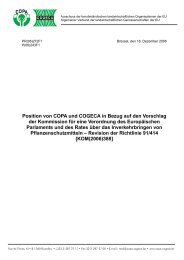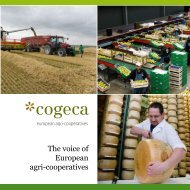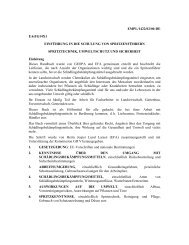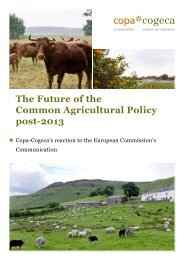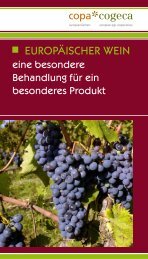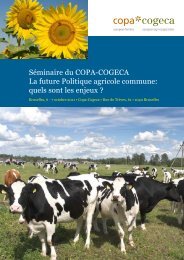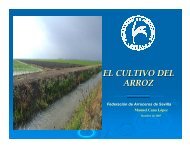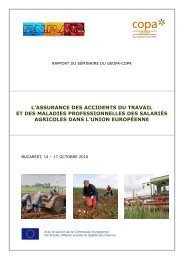MAGAZINE - Copa-Cogeca
MAGAZINE - Copa-Cogeca
MAGAZINE - Copa-Cogeca
Create successful ePaper yourself
Turn your PDF publications into a flip-book with our unique Google optimized e-Paper software.
April 2012 │ 11<br />
Falkenberg claims currently looking into<br />
applying at international level same<br />
high EU production and environmental<br />
standards to imports and stepping up<br />
controls<br />
In an interview with <strong>Copa</strong>-<strong>Cogeca</strong>, EU Commission Director-<br />
General for the Environment Karl Falkenberg said they<br />
are stepping up import controls and work at international<br />
level on how to apply the same high EU production and<br />
environmental standards to imports of agricultural products<br />
and food imported to the EU.<br />
<strong>Copa</strong>-<strong>Cogeca</strong> argues that the EU is imposing higher and<br />
higher environmental constraints and costly regulations onto<br />
EU producers, which reduces their competitivity, and the same<br />
rules are not applied to imports. For example, the EU has just<br />
imposed a ban on un-enriched cages for laying hens on its own<br />
producers, which has cost them over 5 billion euros, and not<br />
on imports. Prices have risen as a result of this ban and producers<br />
have had to de-populate in the short term to give time to adjust<br />
to the new standards and costs or cease their production. And<br />
now the industry is looking to boost imports, which do not<br />
have to meet the same standards, in order to fill the gap.<br />
<strong>Copa</strong>-<strong>Cogeca</strong> insists that the same standards which are<br />
applied in the EU must apply to imports. Mr Falkenberg<br />
acknowledged the problem, saying that this hasn’t been achieved<br />
at international level yet within the WTO but they are working<br />
on it. They nevertheless try and incorporate it into bilateral<br />
trade agreements and have been looking at enhanced labelling<br />
requirements for imports. They have also stepped up import<br />
controls, he added.<br />
<strong>Copa</strong>-<strong>Cogeca</strong> also warns against imposing further mandatory<br />
environmental constraints onto EU farmers, which has been<br />
proposed by the Commission under its CAP post-2013<br />
proposals, and which again do not apply to imported products.<br />
<strong>Copa</strong>-<strong>Cogeca</strong> arges that we are already far ahead in terms of<br />
greening than other non-EU countries and now is not the time<br />
to impose further costly constraints onto EU farmers. <strong>Copa</strong>-<br />
<strong>Cogeca</strong> instead advocates the need for green growth measures<br />
which benefit the environment at the same time as maintaining<br />
productivity and competitivity. <strong>Copa</strong>-<strong>Cogeca</strong> argues that there<br />
is no sense in taking land out of production, as proposed by the<br />
Commission, in the wake of growing food demand and when<br />
the environmental benefits of it are questionable. It is not the<br />
right way forward. This has also been supported by many EU<br />
Farm Ministers and MEPs. Defending the move, Mr Falkenberg<br />
insisted that its an intelligent form of set-aside.<br />
Mr Falkenberg went onto highlight the benefits of innovation<br />
which <strong>Copa</strong>-<strong>Cogeca</strong> supports, believing it essential to boost<br />
productivity using less resources. <strong>Copa</strong>-<strong>Cogeca</strong> welcomes the<br />
EU Commission latest move to set up European Innovation<br />
Partnerships.


